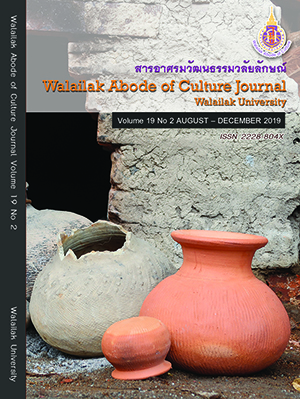Can “New Institutionalism” in Thai Constitution (2017) create a peaceful society?
Main Article Content
Abstract
Can the current Thai Constitution (2017), which was analyzed based on the concept of “New Institutionalism”, prevent a coup d’etat and create political stability? Will Bangkok be a peaceful society and how can it be? What are factors that can promote reconciliation or reduce wars between people with different color shirts? Should policy makers/ Thai political leaders step away from the Old Institutionalism and move to the New Institutionalism so that Thailand politics will be better in the near future? The purposes of this article are a) to employ the concept of New Institutionalism to explain the cooperation and conflicts based on the Constitution 2017 to see whether or not it can create peace in the Thai society and b) to explore whether or not, based on the Thai Constitution (2017), Thailand will be able to reduce conflicts and be free from the next coup d’etat. The author would like express political opinions through various perspectives. The article emphasizes that the New Institutionalism should build up “Institutional” to the Thai politics and create cooperation and harmonious living among Thai people.
Article Details
© 2018 by Asian Journal of Arts and Culture, Walailak University. All rights reserved.
References
Chaiphinit, J. (2015). An institutional approach of Beverly Crawford: A critical analysis. Journal of Political Economy Burapha University, 3(1), 1-27.
Sirisamphan, T. (2004). The Development of Thai Bureaucracy: Apply the public administration in practices, Scope of Public Administration of Woodrow Wilson. Public Administration: Scope and apply of the knowledge (p. 57). Bangkok, Thailand: Faculty of Political Science, Chulalongkorn University.
Thanasathit, U. (2006). Thai politics in the context of plutocracy. Bangkok, Thailand: University of the Chamber of Commerce.
English, A. B., Browning, G. K., Huggins, R., & Rosamond, B. (2002). Politics: An introduction (2nd ed.). London, England: Roultedge.
Connors, M. K., & Hewison, K. (2007). Introduction: Thailand and the “good coup”. Journal of Contemporary Asia, 38(1)2007, 1-10.
Fiorina, M. (1995). Rational choice and the new (?) institutionalism. Polity, 28(1), 107-115.
Gladden, E. N. (1952). An introduction of public administration (2nd ed.). NY: Staples Press.
Hoffman, J. & Graham, P. (2015). Introduction to political theory (3rd ed.). Abingdon, Oxon: Routledge.
Lane, J. (2000). New public management. NY: Taylor & Francis Group.
Lowndes, V. & Roberts, M. (2013). Why institutions matter: The new institutionalism in
political science. NY: Palgrave Macmillan.
March, J. G. & Olsen, J. P. (2005). The new institutionalism: Organization factors in political life.
in Peters, B. G. Peters. Institutional theory in political science: The new institutionalism (pp. ) London, England: Continuum.
Morlino, L., Berg-Schlosser, D., & Badie, B. (2017). Political science: A global perspective. London, England: Sage Publications.
Peter, B. G. (2012). Institutionalism theory in political science (3rd ed.). London, England: Continuum.
Riemer, N., Simon, D. W., & Romance, J. (2014). the Challenge of politics: An introduction to political science (4th ed.). London, England: Sage Publications.
Shepsle, K. A. (2010). Analyzing politics: Rationality, behavior and institutions (2nd ed.). NY: W. W. Norton.
Williamson, O. E. (2000). The new institutional economics: Taking stock, looking ahead. Journal of Economic Literature, 38(3) 595-613.


